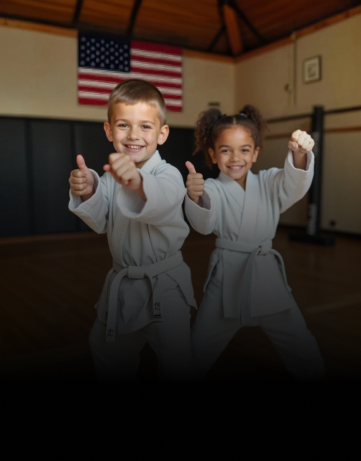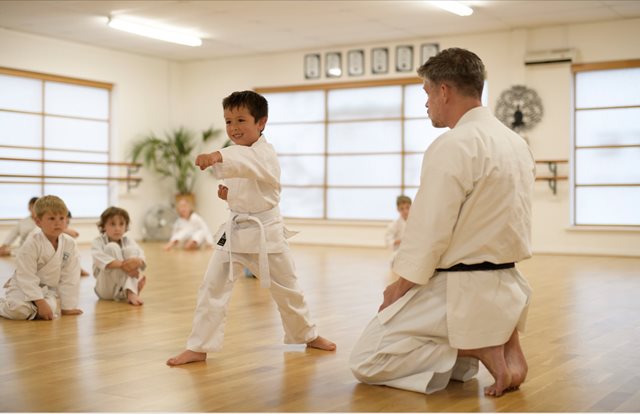Just How Karate for Children Can Increase Confidence and Technique in Young Martial Artists
Karate for youngsters offers an one-of-a-kind opportunity to build self-confidence and discipline in young martial musicians. As they find out new methods and face challenges, they not just obtain abilities however also establish a solid feeling of self-regard. This structured atmosphere encourages them to appreciate the trip of renovation. But exactly how does this training equate right into their day-to-day lives? Discover the much deeper links that make karate greater than just a sport.
The Relevance of Confidence in Childhood Development
Confidence is a crucial structure block in childhood growth. When you nurture your youngster's self-confidence, you equip them to encounter obstacles, take threats, and share themselves openly. Kids with self-confidence are a lot more ready to discover social situations and brand-new activities, which can cause enduring friendships and beneficial experiences.Encouraging your child to tip out of their convenience area cultivates strength. They discover that failure isn't the end yet instead a stepping rock to success. By celebrating their achievements, no issue exactly how tiny, you aid them identify their capabilities and worth.In this journey, support and positive support from you play an essential role. Whether it's with appreciation or just being present, your participation boosts their self-confidence. As they grow, this self-assurance comes to be a long-lasting asset, outfitting them to browse both difficulties and possibilities with a solid sense of self.
Just How Martial Arts Instructs Technique and Emphasis
Martial arts assists you develop discipline and focus via its structured training program. As you practice mindfulness during each session, you'll learn to focus much better both on and off the floor covering. Plus, setting and attaining objectives in karate enhances your capability to stay fully commited and mindful.
Structured Training Program
While you take part in karate training, you'll swiftly uncover just how a structured routine instills technique and emphasis in young specialists. Each course complies with a details style, including warm-ups, strategy method, and sparring. This uniformity shows you to devote and value the procedure to improvement. As you find out kinds and techniques, you create a feeling of responsibility for your very own progress.The organized atmosphere motivates you to set goals, whether understanding a brand-new belt or perfecting a kata. You'll locate that staying focused throughout drills and courses develops your concentration. The self-control you grow in martial arts extends beyond the dojo, positively impacting your schoolwork and daily routines. Each session enhances the relevance of devotion, assisting you grow into a much more disciplined individual.
Mindfulness in Method
As you exercise martial arts, you'll locate that mindfulness comes to be a crucial component of your training. Each move requires your full interest, assisting you remain concentrated on today minute. You'll find out to disregard disturbances and focus on your breathing, activities, and intentions. This enhanced recognition develops your reflexes and boosts your discipline.During sparring or kinds, you'll discover the significance of being emotionally present - Karate Salisbury MD. You'll discover exactly how this emphasis not just boosts your method yet additionally develops your self-confidence. By exercising mindfulness in karate, you cultivate patience and resilience, necessary traits that prolong beyond the dojo. In this means, karate teaches you to harness your mind, aiding you create a self-displined method to challenges both on and off the floor covering

Setting Goal Techniques
Setting objectives in karate isn't nearly earning belts; it's an effective method to cultivate self-control and focus. When you establish particular, attainable targets, you develop a roadmap for your progress. Instead of just intending to improve your kicks, try concentrating on understanding a particular method each month. This method keeps you determined and engaged.Breaking down bigger goals right into smaller sized, manageable steps helps you track your development and celebrate small success along the way. Whether it's developing your stance or enhancing your sparring endurance, every objective enhances your commitment. As you attain these objectives, you'll build self-confidence in your skills and create a solid feeling of discipline that prolongs past the dojo right into everyday life.
Building Durability With Martial Arts
Fighting style, specifically martial arts, offers kids a distinct chance to develop resilience in a supportive setting. In classes, they face difficulties that push their restrictions, whether it's competing or mastering a new technique with a partner. Each trouble, like a missed kick or a shed match, ends up being a possibility to learn and grow.As they practice, children learn to welcome pain and maintain trying, even when points get challenging. They find that failing isn't the end; it belongs to the trip. This frame of mind aids them get better more powerful, not just in the dojo, but in everyday life.With each challenge check out here they get over, your youngster develops confidence in their ability to take on challenges, fueling their determination. Through martial arts, they'll understand that strength isn't almost physical toughness; it's concerning mental grit and determination, equipping them to deal with whatever life throws their means.
The Duty of Respect in Martial Arts Educating
Respect is a fundamental principle in karate training, fostering a society of self-control and sociability among students. When you tip onto the dojo floor, you're not just discovering strategies; you're additionally finding out to respect your teachers, peers, and the art itself (Karate Salisbury MD). Bowing at the beginning and end of class isn't just a formality; it represents your acknowledgment of others' dedication.as and efforts you create shared regard, you'll find it boosts your knowing experience. You'll pay attention extra diligently to your instructor and gain understandings from fellow trainees. This atmosphere urges positive criticism and assistance, permitting every person to grow together.Moreover, respect cultivates self-control. Recognizing the value of tough job and humility aids you stay focused on your training. Subsequently, this respect equates right into your daily life, boosting your interactions and connections outside the dojo. Via karate, you learn that regard is crucial for individual growth and neighborhood building
Achieving and setting goals Success in Karate

Social Skills and Teamwork in the Dojo
While training in the dojo, kids normally develop essential social skills and synergy abilities. As they exercise together with peers, they discover to communicate effectively, share area, and assistance each other. Each class offers chances for collaboration, whether it's during companion drills or team workouts. This team effort promotes friendships and creates a sense of belonging, making the dojo a nurturing environment.Kids also acquire valuable problem resolution abilities. When they run into challenges, such as differences during sparring, they learn to navigate these situations constructively. They practice patience and compassion, understanding that everyone has various staminas and weaknesses.Moreover, participating in team activities grows a sense of liability. You'll see your child finding out to depend on colleagues and take obligation for their role in a team. These experiences not only improve their martial arts trip but likewise outfit them with social tools they'll lug right into various other locations of life.

The Long-Term Conveniences of Karate Beyond Childhood Years
As kids mature and change right into their adult years, the advantages of karate expand much past the dojo. You'll find that the discipline and focus learned through karate can equate right into your expert and academic life. Establishing and attaining objectives in martial arts fosters a strong work principles, which can press you to master any endeavor.Moreover, the confidence acquired from grasping strategies and competing can boost your self-esteem, helping you deal with difficulties head-on. This strength ends up being very useful as you face the uncertainties of adulthood.Additionally, the social skills established with team effort and friendship in the dojo can cause much better connections in both expert and individual balls. You'll learn to interact efficiently, resolve disputes, and construct an encouraging network.Ultimately, karate forms not simply skilled martial musicians, yet all-round people prepared to handle the globe.
Frequently Asked Concerns
What Age Is Ideal to Begin Karate for Kids?
You can begin martial arts as early as age 4 or five, but it commonly depends on your child's maturity and interest. Discovering a course that suits their age and energy degree makes a large difference.
Are There Any Kind Of Wellness Benefits From Exercising Martial Arts?
Yes, practicing karate deals many health and wellness benefits. You'll enhance your sychronisation, strength, and adaptability while enhancing cardiovascular fitness. And also, it enhances emphasis and psychological wellness, making it a great selection for total physical and mental wellness.
How Usually Should Youngsters Go To Martial Arts Classes?
You should encourage your youngsters to go to karate courses a minimum of 2 to 3 times a week. Uniformity helps them discover techniques successfully and establish skills, making their experience more delightful and gratifying over time.
Can Karate Assist With Managing Stress And Anxiety in Kid?
Yes, martial arts can assist handle stress and anxiety in children. It instructs focus and self-control while supplying a risk-free electrical outlet for power. You'll see your child growing a lot more certain and tranquil as they exercise on a regular basis.
What Equipment Is Needed for Kids Beginning Martial Arts?

Comments on “Best Karate for kids – Award-Winning Programs Centered Around Respect and Resilience”